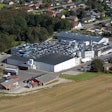Limagrain Céréales Ingredients has recently partnered with Novolyze to reinforce the microbiological control of its proprietary heat process for flours: Farigel. In order to confirm the effectiveness of the Farigel process, Limagrain Céréales Ingrédients chose to use the innovative products developed by Novolyze. The methodology utilizes harmless bacteria that mimic the behavior of foodborne pathogens under different kind of stress.
Jena Roberts, VP of Business Development at Novolyze stated that, “We are honored to partner with a prestigious company of Limagrain’s stature as they are the 4th largest seed company in the world. Limagrain is also a unique partner for Novolyze as they are vertically integrated from seed to flour to cereal ingredients to bakery products. We service the same product categories so this is a very synergistic partnership.”
Even though foodborne pathogens have a small probability to grow in low moisture foods like flour, they can survive for many years due to the low water activity. Pathogen inactivation is usually obtained by the application of a preventive treatment. The Farigel process developed by Limagrain Céréales Ingrédients applies a thermal stress on flours and is therefore considered a preventive control for foodborne pathogens like Salmonella or Escherichia coli.
Roberts added, “the surrogate bacteria developed by Novolyze have a slightly higher resistance compared with the target pathogens to kill. Our surrogates, because they are not pathogenic, can be used directly in-plant or at a pilot scale to conduct tests. The introduction of a pathogen in an industrial environment is strictly forbidden. That is why our clients decide to use our products.”
Thierry Desgrousilliers, Quality Manager at LCI added that “the Farigel process is the result of several years of internal development and optimization. Consequently, it is very difficult to reproduce at a laboratory or pilot scale in order to carry out microbial tests. That is the reason why we decided to use Novolyze’s surrogate organisms. The use of Novolyze’s products allowed us to test the efficacy of our process directly in its specific industrial environment, make validation work extremely straightforward and simple.”
A validation project with surrogate microorganisms commonly includes three major steps. The first consists in the definition of a validation strategy. After that, the resistance of the surrogate is verified at lab scale. Roberts explained that “this step is particularly important and determines the whole project validity. As a matter of fact, Codex Alimentarius 2008 clearly underlines this point. In the case of the Farigel process, Novolyze performed an experimental study with Limagrain’s flour. This test enabled to verify that the selected surrogate had a similar resistance to foodborne pathogens. The 3rd and last step consisted in performing validation trials directly on the Farigel process at factory scale. The tested flour was inoculated with the Novolyze surrogate and then distributed in the Farigel process. Post-process samples were collected and analyzed, which enabled to calculate the capacity of the Farigel process to inactivate pathogens.”
Roberts added that “the main advantage of our surrogates is that they are dried and ready to use. Their inoculation with flour is obtained by blending. Our bacteria don’t require a laboratory to be used. It enables to inoculate very easily and precisely small as well as big quantities of food, most of the time directly at the process facilities.”
The results enabled LCI to confirm that the Farigel process was capable of eliminating 5-log of Salmonella. The Novolyze dry surrogate is uniquely used in the production equipment to create “gold-standard” data for the process validation which is a pivotal benefit for regulatory inspections. This study reinforced the control of the Farigel process. Desgrousilliers commented: “this is the first time we objectively confirmed that our process is capable of inactivating foodborne pathogens. Beyond the interests linked to the texturization properties of Limagrain’s flours, this confirms the effectiveness of our process as a microbiological critical control point. We give ourselves a little more time before launching new tests with the same method.”
Surrogate organisms are a key tool to ensure food safety. They are used for regulatory compliance (FSMA etc.). However, they can also be of strong help for product and process innovation. Roberts concluded: “the use of our surrogates enables to obtain a more precise vision of a process effectiveness. In a significant number of cases, the use of our products also enabled to optimize treatment parameters with the following outcomes: improved organoleptic and nutritional quality of food, reduced energy expenses and productivity gains.”
Both companies are excited that a validation project can also improve efficiency via process optimization.


















